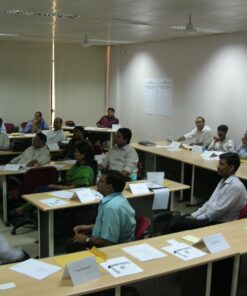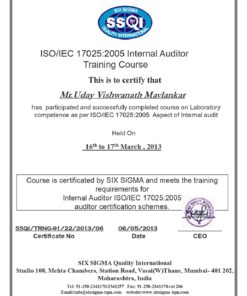Sale!
Lead Auditor Training on ISO 14001
Original price was: ₹20,000.00.₹15,000.00Current price is: ₹15,000.00.
ISO 14001 is an internationally recognized standard for environmental management systems (EMS). If you’re interested in becoming a lead auditor for ISO 14001, you’ll need to undergo specific training to understand the requirements of the standard, the auditing process, and how to evaluate an organization’s EMS effectively.
Here’s an overview of the typical training requirements and topics covered in lead auditor training for ISO 14001:
### Training Requirements:
1. **Basic Knowledge of ISO 14001:** Before attending lead auditor training, it’s beneficial to have a basic understanding of ISO 14001 and its principles. This can be gained through introductory courses or self-study.
2. **Auditing Experience:** Some training providers may require participants to have prior auditing experience, either as internal auditors or in another auditing role.
### Topics Covered in Lead Auditor Training:
1. **Introduction to ISO 14001:**
– Principles and benefits of an EMS
– Key terms and definitions
2. **ISO 14001 Requirements:**
– Context of the organization
– Leadership and commitment
– Planning
– Support
– Operation
– Performance evaluation
– Improvement
3. **Auditing Principles and Practices:**
– Types of audits (e.g., internal, external, third-party)
– Audit planning and preparation
– Conducting audit interviews
– Collecting and verifying evidence
– Reporting audit findings
4. **Audit Techniques and Tools:**
– Risk-based auditing
– Sampling methods
– Non-conformance identification and classification
– Root cause analysis
5. **Audit Reporting and Follow-up:**
– Writing clear and concise audit reports
– Communicating findings to stakeholders
– Corrective action and follow-up
6. **Case Studies and Practical Exercises:** Many training programs include hands-on exercises and case studies to allow participants to practice auditing skills in a controlled environment.
### Certification:
Upon successful completion of lead auditor training, participants may be eligible to take a certification exam to become a certified lead auditor for ISO 14001. Certification requirements vary by training provider and certifying body.
### Training Providers:
There are several organizations and training providers that offer lead auditor training for ISO 14001. It’s essential to choose a reputable provider that is accredited by a recognized certification body to ensure the quality and recognition of your training.
### Conclusion:
Becoming a lead auditor for ISO 14001 requires a combination of knowledge, skills, and experience in environmental management systems and auditing. By completing comprehensive lead auditor training and gaining practical auditing experience, you can develop the expertise needed to evaluate and audit organizations’ EMS effectively.
If you’re serious about pursuing this career path, I recommend researching accredited training providers, reviewing their course offerings, and selecting a training program that aligns with your learning objectives and career goals. Good luck!











Reviews
There are no reviews yet.